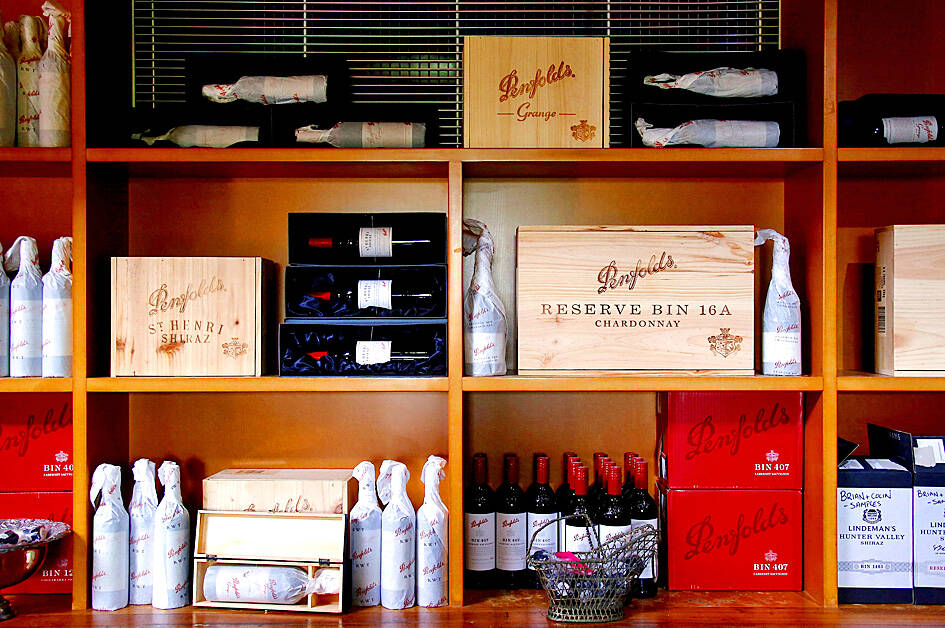Australia’s Treasury Wine Estates Ltd, best known for its Penfolds brand, is cautious about trade resuming with China and not banking on the removal of tariffs even as diplomatic ties show signs of warming.
The company is working on the assumption that China will remain closed, Treasury Wine Estates CEO Tim Ford said yesterday.
“Clearly there’s no change at the moment, and that’s very important to note,” he said on an earnings call.

Photo: Reuters
Once the company’s most lucrative market, exports of wine to China have dwindled after Beijing in late 2020 imposed tariffs of more than 200 percent on Australian products amid deteriorating ties between the two countries.
While there are expectations the trade barriers would start to ease as relations improve, the comments from Ford signal the industry remains cautious.
To dodge the import tariffs, Treasury launched made-in-China Penfolds last year.

Photo: EPA-EFE
The company yesterday said it is returning to growth in China through its multicountry of origin strategy.
This includes its inaugural release of a French collection targeted almost exclusively at the Chinese market, it added.
“There are positive tones so we’ve also started to think through what could occur and what would occur, and what we would do should it change,” Ford said.
The company would continue to build out Penfolds’ Chinese wine portfolio and grow the business elsewhere in Asia, he said.
The winemaker posted earnings for the first half of this fiscal year that missed the average analyst estimate.
Shares tumbled as much as 7.6 percent in Sydney, the most in two years.
Jefferies Financial Group Inc analyst Michael Simotas said that while the luxury segment performed well in all of Treasury’s key markets, entry-level premium wine and commercial wine were weaker than forecast.
He said he expects downgrades and the stock to underperform.
Goldman Sachs Group Inc was more upbeat, rating the stock a buy and saying China’s reopening would be a crucial positive driver.

WEAKER ACTIVITY: The sharpest deterioration was seen in the electronics and optical components sector, with the production index falling 13.2 points to 44.5 Taiwan’s manufacturing sector last month contracted for a second consecutive month, with the purchasing managers’ index (PMI) slipping to 48, reflecting ongoing caution over trade uncertainties, the Chung-Hua Institution for Economic Research (CIER, 中華經濟研究院) said yesterday. The decline reflects growing caution among companies amid uncertainty surrounding US tariffs, semiconductor duties and automotive import levies, and it is also likely linked to fading front-loading activity, CIER president Lien Hsien-ming (連賢明) said. “Some clients have started shifting orders to Southeast Asian countries where tariff regimes are already clear,” Lien told a news conference. Firms across the supply chain are also lowering stock levels to mitigate

IN THE AIR: While most companies said they were committed to North American operations, some added that production and costs would depend on the outcome of a US trade probe Leading local contract electronics makers Wistron Corp (緯創), Quanta Computer Inc (廣達), Inventec Corp (英業達) and Compal Electronics Inc (仁寶) are to maintain their North American expansion plans, despite Washington’s 20 percent tariff on Taiwanese goods. Wistron said it has long maintained a presence in the US, while distributing production across Taiwan, North America, Southeast Asia and Europe. The company is in talks with customers to align capacity with their site preferences, a company official told the Taipei Times by telephone on Friday. The company is still in talks with clients over who would bear the tariff costs, with the outcome pending further

Six Taiwanese companies, including contract chipmaker Taiwan Semiconductor Manufacturing Co (TSMC, 台積電), made the 2025 Fortune Global 500 list of the world’s largest firms by revenue. In a report published by New York-based Fortune magazine on Tuesday, Hon Hai Precision Industry Co (鴻海精密), also known as Foxconn Technology Group (富士康科技集團), ranked highest among Taiwanese firms, placing 28th with revenue of US$213.69 billion. Up 60 spots from last year, TSMC rose to No. 126 with US$90.16 billion in revenue, followed by Quanta Computer Inc (廣達) at 348th, Pegatron Corp (和碩) at 461st, CPC Corp, Taiwan (台灣中油) at 494th and Wistron Corp (緯創) at

NEGOTIATIONS: Semiconductors play an outsized role in Taiwan’s industrial and economic development and are a major driver of the Taiwan-US trade imbalance With US President Donald Trump threatening to impose tariffs on semiconductors, Taiwan is expected to face a significant challenge, as information and communications technology (ICT) products account for more than 70 percent of its exports to the US, Chung-Hua Institution for Economic Research (CIER, 中華經濟研究院) president Lien Hsien-ming (連賢明) said on Friday. Compared with other countries, semiconductors play a disproportionately large role in Taiwan’s industrial and economic development, Lien said. As the sixth-largest contributor to the US trade deficit, Taiwan recorded a US$73.9 billion trade surplus with the US last year — up from US$47.8 billion in 2023 — driven by strong